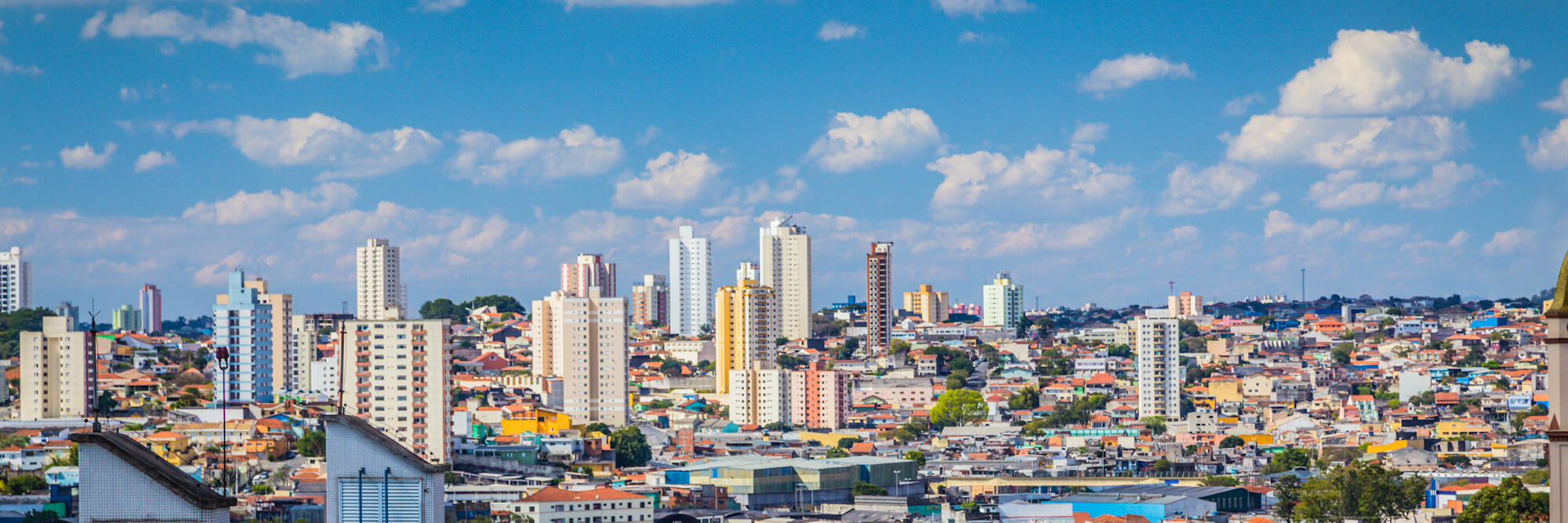Finding and securing accommodation in São Paulo is one of the most daunting challenges expats will face when moving to Brazil’s economic hub. Whether you plan on renting or buying property in São Paulo, it’s worth familiarising yourself with the city’s property market.
Areas and suburbs in São Paulo
São Paulo is a sprawling city divided into 32 administrative boroughs, with plenty of areas and suburbs for expats to choose from. Despite its reputation as a stark metropolis, São Paulo has pockets of greenery across its parks and several neighbourhoods that provide ideal bases for expat families.
Areas like Chácara Flora and Jardins have easy access to secure housing and numerous amenities for expats and their children. These areas range from moderately priced to luxury neighbourhoods that are home to diplomats and celebrities. Although it’s located further from the city centre, Alphaville also offers family-friendly options.
For young and single expats, suburbs such as Vila Madalena and Pinheiros are ideal, as they are located within the city centre area and have lively social scenes. Brooklin is better suited for corporate professionals working in the financial district. These neighbourhoods have numerous amenities and excellent transport links that facilitate travel to work and other areas of São Paulo.
International Schools in São Paulo
Lifestyle in São Paulo
See the page on Areas and Suburbs in São Paulo for more details on the best areas to live in the city.
Types of accommodation in São Paulo
There are several types of accommodation options that are popular among expats in São Paulo. Most rental accommodation in São Paulo is unfurnished, but the demand for comfortable, fully furnished accommodation has increased recently, and real estate agents have started catering to the needs of the international community. The standard of accommodation in São Paulo is high, especially in newly built properties.
One option for expats who prefer to live near the city centre is known as a prédio. These are 10- to 30-storey buildings which are found in central areas of São Paulo and are full of furnished apartments. Space is limited, but these complexes have good facilities and security. Prédios are particularly popular among young professionals looking for comfortable and centrally located accommodation.
Another option is to live in one of the city’s many condomínios. These are fenced-off housing blocks with shared facilities such as swimming pools, gyms, recreational areas and outdoor spaces. They are usually found in upper- and middle-class parts of São Paulo and are popular with expat families who prioritise safety and space for their children.
Expats can also look for standalone family homes, but these are a rarity in central São Paulo and can often only be found in the suburbs. These houses frequently have swimming pools and barbecue areas. They tend to be popular with expats who have decided to buy a property and settle in Brazil on a longer-term basis.
Co-living spaces are a newer accommodation option which has gained some popularity among young expats. These shared housing arrangements offer furnished rooms with communal areas and are particularly common in central neighbourhoods like Santa Cecília and República. Co-living spaces are flexible and help create a sense of community, and they’re a favourite with digital nomads and young professionals new to the city.
Finding accommodation in São Paulo

The cost of living in São Paulo is high, and expats frequently struggle to find suitable accommodation at a reasonable price, and rental prices have increased significantly in recent years. Some companies arrange housing for their workers, which makes the relocation process far more straightforward. São Paulo has a good supply of holiday and short-term rental properties for temporary accommodation while expats look for more permanent accommodation.
Expats relocating to São Paulo can use the internet to familiarise themselves with the type of accommodation available and the city’s neighbourhoods. The leading property portals are OLX Brasil, Imovelweb, and QuintoAndar. Be aware that rental prices on English sites are likely to be higher than a similar listing would be on a Portuguese site.
Social media platforms, particularly Facebook groups and expat communities, can also be excellent sources of information. Asking around at work or among acquaintances can also help, as many of the best deals travel by word of mouth.
Expats often find that their best bet is usually to work with a real estate agent to find the ideal home. Estate agents in São Paulo typically have extensive knowledge about the areas and suburbs of the city and are better placed to source suitable housing. Real estate agents also know about potential properties before they even enter the market.
Some people moving to São Paulo will be lucky enough to have a relocation company working on their behalf to assess their preferences and shortlist properties for them to view. These services are particularly valuable for corporate expats who need to secure housing before arrival.
Useful links
Renting accommodation in São Paulo

São Paulo’s rental market is one of the fastest-moving in the world, and demand for accommodation in the city is sky-high. When beginning the search, ensure you have all your documentation and deposits ready. Without these items at the ready, you’ll likely lose out on the property of your dreams.
Making an application
To rent property in São Paulo, expats will need to provide several certified documents, including proof of income, their Cadastro de Pessoas Fisicas (CPF) number and copies of their passport and work permit. Those without a formal or sufficient income, such as retirees or students, will need to find someone to act as a guarantor or fiador.
Leases and deposits
A deposit of one to three months’ rent was traditionally expected, although this has become less common. Many landlords now opt for seguro-fiança (rental insurance), which charges a nonrefundable fee of one to one and a half months’ rent per year. You can often opt to pay it in instalments over the contract period. Alternatively, many opt for a guarantor system.
When traditional deposits are used, landlords should put the deposit into a separate savings account, with any interest earned belonging to the renter once the contract is terminated.
When renting from companies, rental agreements are typically 30 months long, although individual landlords can offer 12-month minimums. Expats can negotiate different terms with their landlord, as both parties have the right to agree on alternative durations.
Terminating the lease
If expats need to break their lease within the first 12 months, they may face penalties equal to the remaining rent up to the end of the first year. After 12 months, tenants can terminate by providing written notice equal to the number of months of deposit paid (typically three months), with the deposit used to cover rent during this notice period. Alternatively, tenants can give 30 days’ notice but will forfeit their entire deposit and may face additional penalties.
Whatever the termination method, expats must return the property in the same condition as when they moved in, often including repainting if the apartment was freshly painted upon occupancy. Brazilian law recognises exceptional circumstances, such as job loss or work relocation, that may allow for more favourable terms, so expats should discuss their situation with their landlord. If neither party provides notice before the lease expires, the contract automatically renews for another term.
See the page on Accommodation in Brazil for more details on the leases and rental process in the country.
Utilities in São Paulo

Unless renting a fully furnished and serviced apartment in São Paulo, the tenant will likely be responsible for contacting utility suppliers to have their services connected. Real estate agents typically have the expertise to assist with utility connections. In some cases, the administration department of a particular apartment building or housing complex will help new tenants get connected.
Electricity and gas
Expats moving into a new place generally have to get their electricity connected by phone or in person. The electricity supplier in São Paulo is Enel São Paulo, and you will need to find the nearest office to get an agent to come and connect your electricity.
Expats with an existing account must get someone from Enel São Paulo to disconnect them at their current place and calculate their final bill. Expats will need to leave their new address to receive and pay their final bill. Electricity bills are paid monthly on Enel São Paulo’s website through a direct debit option or at the bank.
Ultragaz and Liquigás are the leading providers of bottled gas in São Paulo, and Comgás is the only supplier of mains and natural gas in the city. Expats can contact Comgás’s customer service centre and provide their name and address to create a customer account and connect their gas.
Water
Sabesp, which was privatised in 2024, only allows property owners to connect to water and waste services in São Paulo. New arrivals moving into apartments can arrange for their building managers to turn on their water supply, and the cost will usually be charged through the condominium charge.
Expats moving into a detached home can contact Sabesp customer service to re-establish their connection and add their name to the water bill. Newcomers will need to provide the agent with their CPF and residence reference numbers, and they will connect their services within three days. Fortunately, Sabesp offers expats the option to request English-speaking operators to assist them.
The person who comes to read the water meter will typically bring the monthly bill. Most expats pay the bill via their bank, either through a direct deposit, online or in person.
Bins and recycling
Some suburbs in São Paulo have colour-coded bins for recycling, but expats typically leave their plastic, glass, paper, and metal recyclable waste in separate bags on the pavement or designated crates for pickup. Each neighbourhood has a designated collection day, and expats can visit the city hall website to find their collection day. Expats must ensure they place their rubbish on the pavement at least two hours before the collection lorry is set to pass, as putting it out outside these hours will result in a fine.
Many grocery shops in the city also provide recycling bins. Some items, such as cooking oil, fluorescent light bulbs and batteries, must be taken to designated recycling stations throughout São Paulo, as they cannot be recycled with common household waste.
